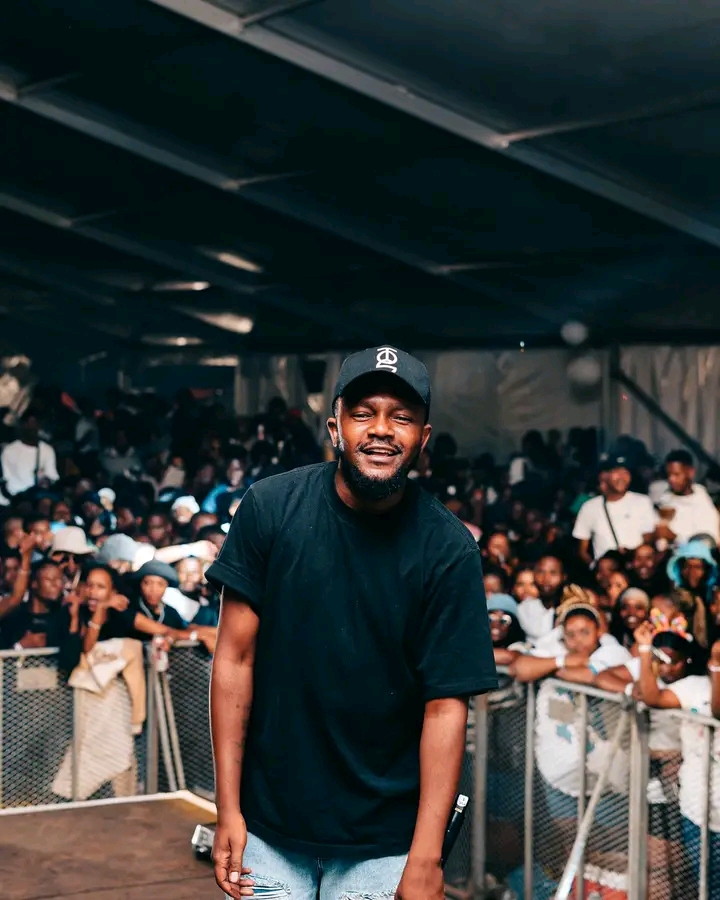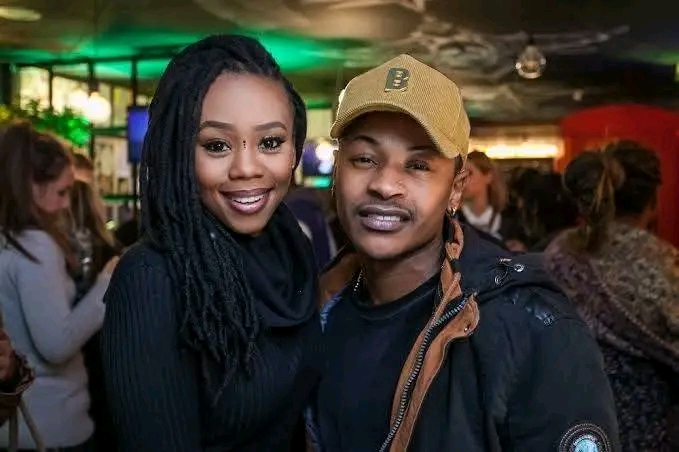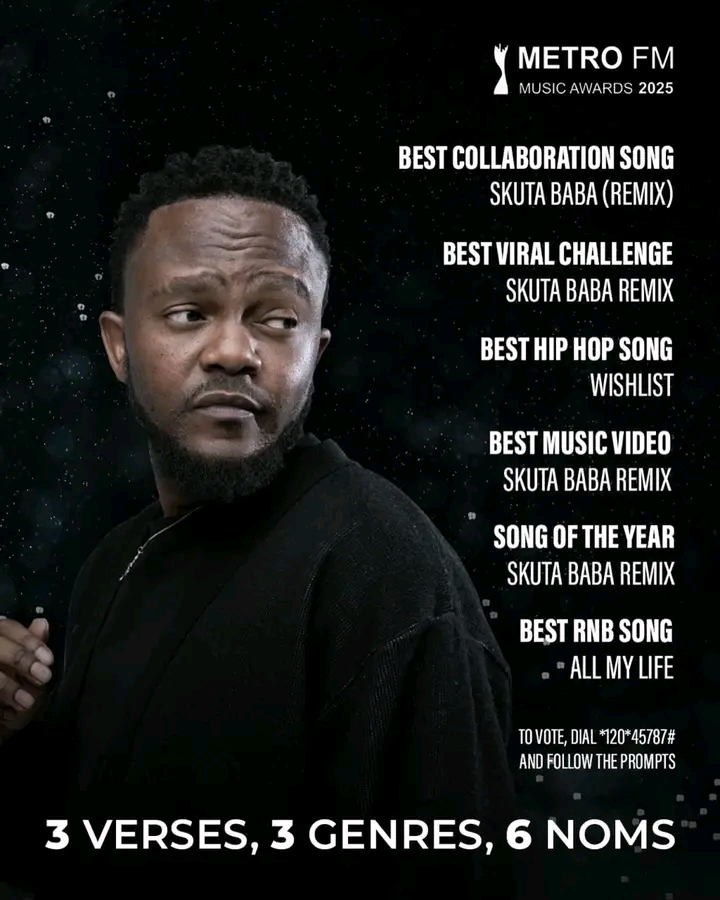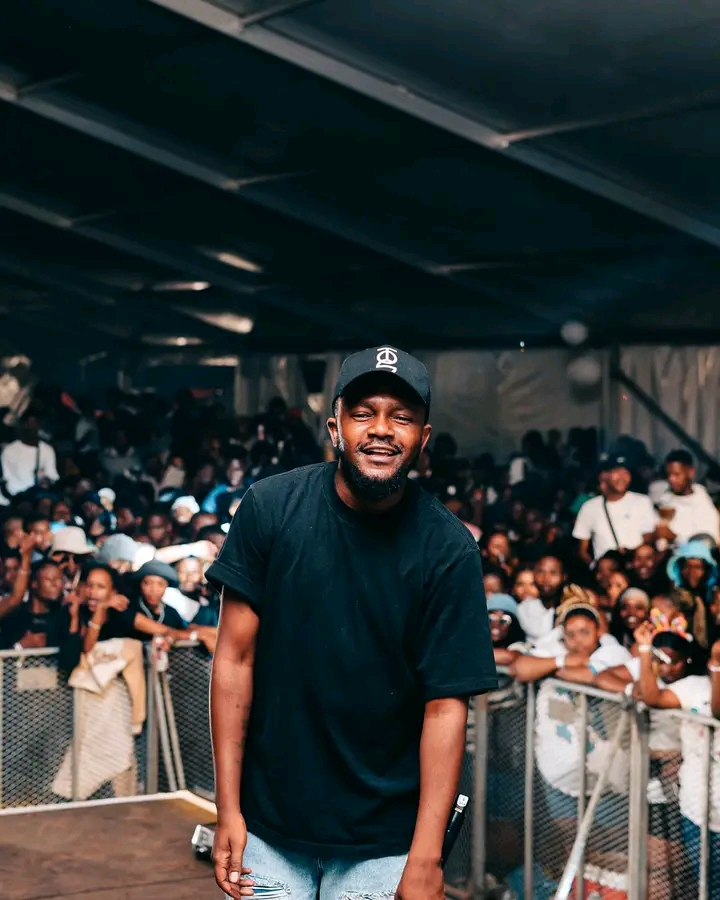"Kwesta: From Katlehong Poet to King of African Rap"
Keabosmart
23 May 2025
Born on August 11, 1988, in the township of Katlehong—affectionately known as "K1"—Kwesta's affinity for music was evident from a young age. His initial foray into the arts began with poetry during his high school years, where he received encouragement from peers and teachers alike . This passion for words naturally transitioned into rap, leading him to form a group called Ghetto Fellaz in 2003, which later evolved into The Juvenylz .
Senzo Mfundo Vilakazi, widely recognized by his stage name Kwesta, stands as a monumental figure in South African hip-hop. From his humble beginnings in Katlehong, Gauteng, to achieving multi-platinum status and international acclaim, Kwesta's journey is a testament to talent, perseverance, and authenticity.
Early Life and Introduction to Music
Born on August 11, 1988, in the township of Katlehong—affectionately known as "K1"—Kwesta's affinity for music was evident from a young age. His initial foray into the arts began with poetry during his high school years, where he received encouragement from peers and teachers alike . This passion for words naturally transitioned into rap, leading him to form a group called Ghetto Fellaz in 2003, which later evolved into The Juvenylz .

Demonstrating unwavering commitment to his craft, Kwesta made the bold decision to leave high school at the age of 16 to pursue music full-time . This leap of faith marked the beginning of a journey that would see him rise to the pinnacle of South African hip-hop.
Breaking into the Industry
Kwesta's initial steps into the professional music scene were marked by perseverance and strategic collaborations. In 2007, he released his first radio single, "Shap Fede," followed by a mixtape in collaboration with hip-hop DJ C-Live . These early projects helped him gain traction in the local music circuit.
By 2008, Kwesta was actively performing across South Africa, sharing stages with notable artists such as DJ Naves, Shugasmakx, and Slikour . His growing reputation led to his selection as a Brand South Africa ambassador for the 2010 FIFA World Cup, where he headlined a nationwide roadshow tour, further solidifying his presence in the industry.
Discography and Musical Evolution
Special ReKwest (2010): Kwesta's debut studio album introduced him to a broader audience, showcasing his lyrical prowess and unique sound.
DaKAR (2013): An acronym for "Da King of Afrikan Rap," this sophomore album debuted at number three on the South African iTunes Hip-Hop/Rap chart, signaling Kwesta's rising prominence in the music scene .
DaKAR II (2016): This third studio album became a monumental success, achieving 7× Platinum certification by the Recording Industry of South Africa (RiSA) and becoming the best-selling South African hip-hop album of all time . The album featured chart-topping singles such as "Ngud'" featuring Cassper Nyovest, which debuted at number one on iTunes and was certified 5× Platinum , and "Ngiyaz'fela Ngawe" featuring Thabsie, which achieved Diamond status and was certified 119× Platinum by 2021 .
g.o.d Guluva (2021): Kwesta's fourth studio album debuted at number three on the South African Top 100 Albums chart and featured collaborations with artists like Thabsie, Focalistic, TLT, Yanga Chief, and K.O., showcasing his versatility and continued relevance in the music industry .
Speak N Vrostaan (2022): A collaborative project with Kabza De Small, this release further demonstrated Kwesta's adaptability and willingness to explore new musical territories .
Awards and Recognitions
Kwesta's contributions to music have been acknowledged through numerous awards:
South African Music Awards (SAMAs): Six wins, including Best Rap Album and Album of the Year for "DaKAR II" .
South African Hip Hop Awards: Four wins, with accolades such as Song of the Year for "Ngiyaz'fela Ngawe" and Lyricist of the Year .
MTV Africa Music Awards: Won Song of the Year for "Ngud'" .
Metro FM Awards: Best Hip Hop for "DaKAR" and Best Collaboration for "Ngud'" .
These accolades underscore Kwesta's impact and influence within the South African music landscape.
Entrepreneurial Ventures and Legacy

Kwesta started dating his wife when he was still unknown artist. Bontle Modisella used to pay for Priddy Ugly's studio sessions when Priddy was still broke.

Lessons we can learn from these two women is that they build up their men, pray for them, hustle and grinding with them.
Most importantly they believed in their dreams and vision regardless of their background and current situation.

Beyond his musical achievements, Kwesta co-founded RapLyf Records with fellow artist Kid X, aiming to nurture and promote emerging talent within South Africa . This venture reflects his commitment to giving back to the community and fostering the growth of the local music industry.
Kwesta's journey from the streets of Katlehong to international stages exemplifies the power of dedication and authenticity. His storytelling ability, combined with a distinctive voice and unwavering passion, has solidified his status as a luminary in South African hip-hop.
"What do I even say? I’ve been here 16 years.. Been at the bottom, been in the middle, been at the top. With all the accolades I have, none means more to me than your hearts.. Some rapper once said.. “ Fcuk the charts, get their hearts cos the love is the only real treasure we own” On this night of #The16thBar 8 years after that line - You proved him right and gave me your hearts.. I can only hope I show you enough of mine. Thank you for everything.
To the artists that graced the stage.. To those that didn’t get to because of communication glitches.. To those that came and still stuck around even when we were running out of time.. Thank you and I love you for that sh*t.
I didn’t do this alone.. I mean did you hear the band? The brass piece? The strings? Did you see the lighting? The graphics? The BV’s? The choir? The dancers? The hosts? Geez bro!! Did you see that stage???
I didn’t do this alone.. Thank you to everyone who worked tirelessly behind the scenes.. You guys know yourselves.. You soldiered for me and I love you for it."
What do I even say?
Thank you
Wise words from this artist from the bottom to the top

May I remind you where he was born guys .... Senzo Mfundo Vilakazi was born 11 August 1988 known professionally as Kwesta, is a South African rapper and songwriter. Born in Katlehong, Gauteng, a township also known as "K1"Kwesta attended Phumlani Secondary School in Katlehong for three years, and later Alafang Secondary School.
He developed an interest in poetry during his high school years and received positive feedback and encouragement from fellow students and teachers.
In 2003, Kwesta became a part of the group The Ghetto Fellas later known as The Juvenylz. The group disbanded after two years.
After the group's disbandment, Kwesta made an agreement with Africa's Most Southern Record Company for the use of their studios. During this time, Kwesta participated in competitions and events to provide visibility for his brand. He took part in YFM's Rap Activity Jam MC of the Month competition. He topped ETV's Shiz Niz Freestyle Kings Special. Also, he performed at The Rand Show, Miss Confidence Show and The Durban Beach Festival.
The rapper dropped out of high school at the age of 16. After which he convinced his mother to give him the taxi fare necessary to get to Buttabing Entertainment's offices. The meeting resulted in him being added to the record label's roster marking the beginning of his signed career. In 2003, at the age of 15, he and his friends formed a rap group Ghetto Fellaz which then changed to The Juvenylz, same year. He is currently signed to his own independent media company known as RapLyf Records with co-founder Kid X. In 2010, he released his debut studio album Special ReKwest. His second album DaKAR (2013), peaked at number 3 on the iTunes South African Hip-hop/Rap chart. Kwesta's third studio album, DaKAR II (2016), spawned with singles includes; "Ngud", "Nomayini", "Day One", "Ngiyazifela Ngawe," "Mayibabo" and "Mmino". The album was certified 7× Platinum by the Recording Industry of South Africa (RISA). Having sold 210,000 copies in South Africa, DaKAR II became South African hip hop'Senzo Mfundo Vilakazi was born 11 August 1988 known professionally as Kwesta, is a South African rapper and songwriter. Born in Katlehong, Gauteng, a township also known as "K1"Kwesta attended Phumlani Secondary School in Katlehong for three years, and later Alafang Secondary School.
He developed an interest in poetry during his high school years and received positive feedback and encouragement from fellow students and teachers.
In 2003, Kwesta became a part of the group The Ghetto Fellas later known as The Juvenylz. The group disbanded after two years.
After the group's disbandment, Kwesta made an agreement with Africa's Most Southern Record Company for the use of their studios. During this time, Kwesta participated in competitions and events to provide visibility for his brand. He took part in YFM's Rap Activity Jam MC of the Month competition. He topped ETV's Shiz Niz Freestyle Kings Special. Also, he performed at The Rand Show, Miss Confidence Show and The Durban Beach Festival.
The rapper dropped out of high school at the age of 16. After which he convinced his mother to give him the taxi fare necessary to get to Buttabing Entertainment's offices. The meeting resulted in him being added to the record label's roster marking the beginning of his signed career. In 2003, at the age of 15, he and his friends formed a rap group Ghetto Fellaz which then changed to The Juvenylz, same year. He is currently signed to his own independent media company known as RapLyf Records with co-founder Kid X. In 2010, he released his debut studio album Special ReKwest. His second album DaKAR (2013), peaked at number 3 on the iTunes South African Hip-hop/Rap chart. Kwesta's third studio album, DaKAR II (2016), spawned with singles includes; "Ngud", "Nomayini", "Day One", "Ngiyazifela Ngawe," "Mayibabo" and "Mmino". The album was certified 7× Platinum by the Recording Industry of South Africa (RISA). Having sold 210,000 copies in South Africa, DaKAR II became South African hip hop'
Conclusion
Kwesta's evolution from a young poet in Katlehong to a multi-platinum artist and industry mogul is a narrative of resilience and artistic integrity. His contributions have not only shaped the soundscape of South African hip-hop but have also inspired a new generation of artists to pursue their dreams with fervor and authenticity.
Post Statistics
Views
8
Shares
1
Related Articles
Chance the Rapper’s “No More Old Men”
In vivid snapshots, Chance brings these characters to life: Mr. Darden catching the bus from Halsted, Mr. Harper worn out but still showing up, old Kangol hats and bifocals, the laughter of the barbershop, and those legendary stories of blocks and loves they can’t return to. Jamila Woods’ smooth, almost spiritual vocals add an extra layer of warmth, making the track feel like a tribute and a eulogy at the same time.
Read MoreThe Importance of Consistency in Music
Consistency also builds trust. When fans know they can count on you to deliver, they become loyal. They start to feel part of your journey, anticipating what’s next. This loyalty often translates into long-term success, because a connected fanbase will support you through different seasons of your career.
Read More